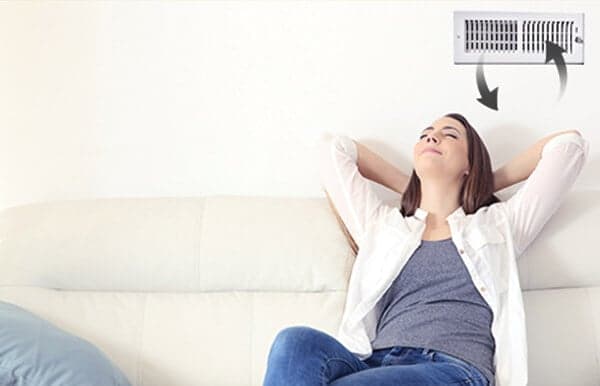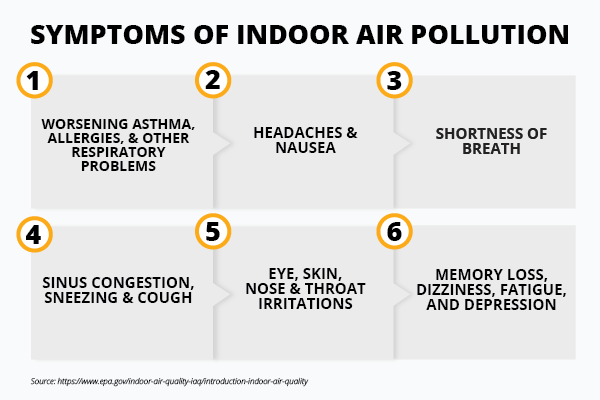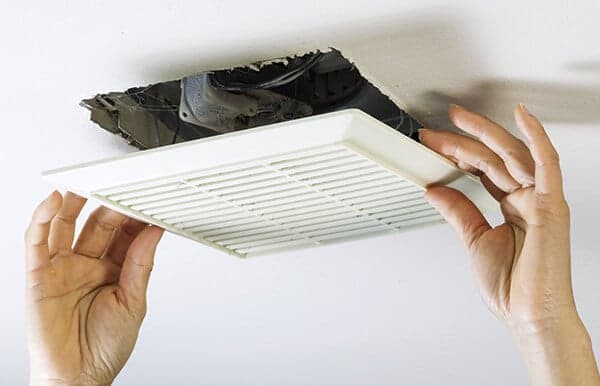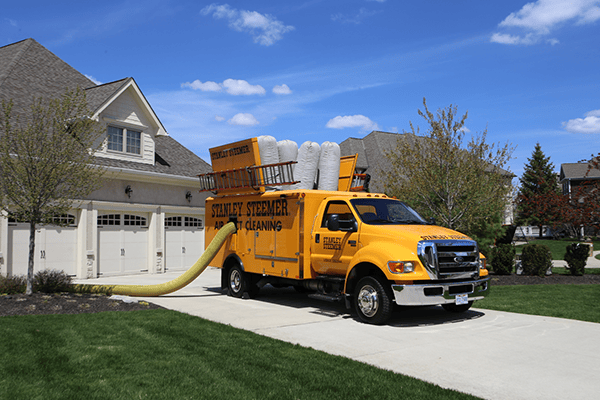Can You Clean Your Own Air Ducts?
Clean air ducts are an important part of home health. While there’s no true substitute for professional cleaning, there are ways to help minimize dust around vent covers and maintain a cleaner home.
Air duct cleaning is vital to help purify the air you breathe every day. According to the National Air Duct Cleaners Association (NADCA), air is re-circulated around 3-8 times an hour in your home. So, when your air vents look dirty, that dirt holds contaminants that are circulated through your home multiple times a day.

Getting contaminants out of air ducts is important for all homes, and according to NADCA, it’s especially pertinent if you or your family members:
- Have pets
- Have allergies
- Have asthma
- Smoke cigarettes
- Complete home renovation or remodeling projects
- Recently experienced a water damage emergency
What is IAQ and How Does it Impact My Home?
All of those factors and more go into your indoor air quality, or IAQ, which is the air quality in or around buildings, and most importantly, your home. Living in a home with poor IAQ can lead to immediate and long-term health effects.
According to the Environmental Protection Agency (EPA) immediate effects can be irritation of the eyes, nose, throat, headaches, dizziness and fatigue. These health effects are treatable and can go away. In cases with asthma and allergies, the symptoms may become more severe or agitated.

In some cases, the treatment for these symptoms is to just eliminate exposure to the pollution.
Cleaning Vent Covers
So, where do you start? A good place to start improving your indoor air is by cleaning your air vent covers as dust and other fine particles build up around the grates. This step is absolutely safe to do by yourself and can be added to your weekly or monthly cleaning list.

There are a couple of different ways to clean the dust in between the grates of your vent cover:
- Dust the cover
- Use compressed air to push out the dirt
- Run your vent covers through the dishwasher
- Repaint to give a fresh look
- Soak in a bucket of hot, soapy water
Changing Air Filters and MERV Rating System
Another way you can start cleaning the air in your home is by changing your air filters in your HVAC system. Depending on the living situation in your home, it varies how often you should change your air filters. Stanley Steemer recommends:
- Single person home: once or twice a year, or six to 12 months
- Family home with no pets: three or four times a year, every three to four months
- Family home with pets: five to six times a year, or every two months
- Family home with no pets and occupants with allergies or asthma: five to six times a year, or every two months
- Family home with pets and occupants with allergies or asthma: 12 times a year, or once every month
It’s also important to understand what kind of air filters to buy. Different filters can trap different kinds of contaminants and irritants. Minimum efficiency reporting value or MERV is the recognized way of measuring filter efficiency. Higher MERV ratings correspond to a greater percentage of particles captured on each pass. For homes and family members with pets, asthma or allergies, we recommend a MERV filter of 13-16.
| MERV Ratings | Level | Efficiency | Notes |
|---|---|---|---|
| 1-4 | Budget | Minimum IAQ Impact | Inexpensive |
| 5-8 | Good | General Filtration | Common & Effective |
| 9-12 | Better | Filters Most Small Particulates | For Pets & Allergies |
| 13-16 | Best | Traps Smallest Particulates | Max Filtration |
To better understand MERV ratings, what they trap and why they are important, read more about MERV here.
If your home has gone through any water damage, contamination, HVAC damage, home damage, home renovation or remodeling projects, you should change your air filter as soon as possible.
Reducing Dust Buildup in Your Home
Dust buildup is a pervasive, but natural problem that every home deals with. Along with cleaning vent covers and replacing filters, here are other ways to help reduce dust levels in your home.
- Vacuum regularly and if possible, use a HEPA-filtered vacuum that helps capture more particulates.
- Dust frequently especially in areas that collect more allergens like blinds, drapes, and upholstery.
- Place heavy-duty doormats outside of entry doors to prevent contaminants from coming inside. For the best results, use durable, rubber mats.
- Reduce static electricity by keeping humidity levels around 45% in your home. Static attracts dust and can make it more difficult to clean up.
- Don’t use fabric softener or dryer sheets on cleaning rags or microfiber cloths. This reduces their ability to pick up dust.
Professional Air Duct Cleaning vs. DIY Cleaning
Cleaning your air return, intake vents and HVAC filters are important DIY tips to cleaning the air in your home. Doing both of these steps frequently will improve the way your HVAC functions and the quality of air in your home; however, properly cleaning air ducts requires a professional.
Getting into the ductwork of your home can be dangerous to you and your HVAC system. This process should only be handled by professionals. Expert cleaning companies have the knowledge and equipment to pull dust, debris and allergens from the entirety of your HVAC system.
Stanley Steemer maintains the highest safety standards in the industry. We abide by all OSHA safety standards, especially, lockout/tag-out procedures*, fall prevention and confined space policies. Our crews are thoroughly trained to tackle any job safely and effectively.
*Lock Out/Tag Out Procedures: "...procedures necessary to disable machinery or equipment, thereby preventing the release of hazardous energy while employees perform servicing and maintenance activities. The standard outlines measures for controlling hazardous energies—electrical, mechanical, hydraulic, pneumatic, chemical, thermal, and other energy sources." (OSHA Fact Sheet)
Benefits of Professional Air Duct Cleaning
Outside of safety, two big reasons you should get your air ducts professionally cleaned: (1) Efficiency and (2) Cleanliness. Air duct cleaning clears your HVAC system removing buildup that restricts airflow. According to the Office of Efficiency and Renewable Energy, 43% of the home utility bill goes to heating and cooling. With clean air ducts, you help your HVAC system to run at maximum efficiency – reducing overall wear and lowering utility expenses.
Secondly, the effectiveness of a professional clean will help to improve IAQ so you can breathe cleaner air. It also makes it easier to maintain a cleaner home by removing pounds of pesky dust and dirt that have accumulated in your system.
How We Professionally Clean Air Ducts
We start with a free air duct inspection by our trained specialists. Once we’ve determined the cleanliness of your air ducts, we schedule your official air duct cleaning. On the day of the service, we’ll arrive with our state-of-the-art, vacuum-mounted trucks specially made at a Stanley Steemer facility.
Our process effectively cleans all accessible components of your HVAC system, like coils, the drain pan, registers, air plenum, the ductwork itself, the blower motor & assembly, and the air filter using a powerful, high-performance vacuum. Our method uses agitation combined with compressed air to dislodge contaminants and debris from deep inside the system. The vacuum then pulls the contaminants out of the duct system, leaving behind nothing but clean ductwork, which will allow air to flow freely.

So, when and how often should you have your air ducts cleaned? It’s recommended to get your air ducts inspected every 3-5 years. Depending on the situation of your home, that number can change. Visit our FAQ page for answers on how often you should clean your air ducts depending on your circumstances.
To schedule your free air duct cleaning estimate, call us 24/7 at 1-800-STEEMER.